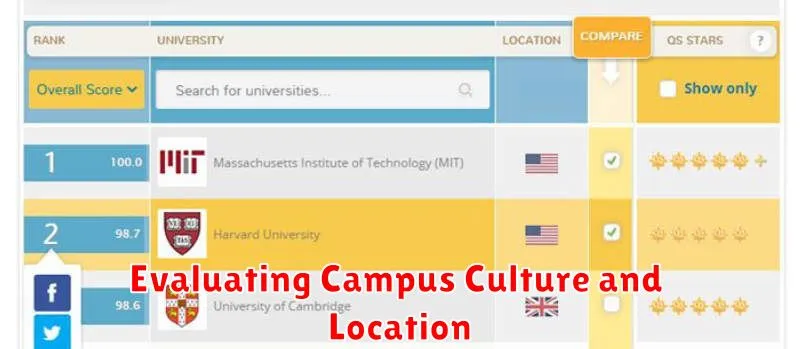Choosing the right university is a pivotal decision that can significantly impact your future career and personal growth. This comprehensive guide will equip you with the necessary tools and knowledge to navigate the complex university selection process. We will delve into key factors to consider, including your academic goals, career aspirations, financial resources, preferred learning environment, and campus culture. By carefully evaluating these elements, you can identify the right university that aligns perfectly with your individual needs and sets you on the path to success.
Finding the perfect university match requires thoughtful introspection and thorough research. This article will explore various strategies to help you define your goals, research potential universities, and evaluate their programs. From understanding different university types and academic programs to considering location, campus size, and student life, we will provide you with a step-by-step approach to making an informed decision. Discover how to assess your academic strengths and weaknesses, explore diverse fields of study, and ultimately choose the right university that will empower you to achieve your goals and unlock your full potential.
Understanding Your Academic and Career Goals
Choosing the right university hinges on a clear understanding of your academic and career aspirations. Identifying your passions and interests is the first step. Where do you see yourself in five or ten years? What subjects genuinely excite you? Honest reflection on these questions will guide you toward suitable academic programs.
Researching potential career paths related to your interests is crucial. Understanding the required qualifications, skills, and educational background for your desired profession will inform your university choices. Do you envision yourself in a research-oriented role, or a more practical, hands-on career? This distinction will influence your decision.
Public vs Private Universities: Pros and Cons
Choosing between public and private institutions is a key factor in your university search. Cost is often a primary concern, with public universities generally offering lower tuition rates for in-state residents. Private universities, while typically more expensive, may offer more financial aid opportunities.
Class size also differs. Public universities often have larger classes, particularly in introductory courses. Private universities tend to offer smaller classes and a lower student-to-faculty ratio, leading to more personalized attention. Consider your learning style and preferences when weighing these factors.
Program offerings can vary as well. Some specialized programs may only be available at certain types of institutions. Research the specific programs you are interested in and see where they are offered.
Researching University Rankings and Programs
University rankings offer a glimpse into institutional strengths, but treat them with caution. Focus on rankings relevant to your chosen field. Specialized rankings often provide a more nuanced perspective than overall university rankings.
Thoroughly research the specific programs offered by each university. Consider factors like faculty expertise, curriculum design, research opportunities, and available resources.
Look beyond rankings and program descriptions. Explore departmental websites, read faculty publications, and connect with current students to gain deeper insights.
Evaluating Campus Culture and Location

Campus culture plays a significant role in your overall university experience. Consider whether you prefer a large university with a vibrant social scene or a smaller, close-knit community. Research student organizations, campus events, and traditions to gauge the overall atmosphere.
Location is another crucial factor. Think about your preferred environment: urban, suburban, or rural. Consider proximity to family, internship opportunities, and cultural attractions. Also, evaluate the climate and its potential impact on your well-being.
Budgeting for Tuition and Living Costs
Tuition is a significant expense. Research university websites for up-to-date costs. Consider in-state versus out-of-state tuition differences.
Living expenses vary greatly depending on location. Factor in housing, food, transportation, and personal expenses. Online cost-of-living calculators can be helpful.
Create a realistic budget that includes all anticipated expenses. Explore financial aid options like scholarships, grants, and loans.
Considering Internship and Networking Opportunities

Internships provide invaluable practical experience and can significantly influence your career trajectory. When choosing a university, research their internship programs and partnerships with relevant companies in your field of interest. A strong internship program can bridge the gap between academic learning and real-world application.
Networking is crucial for career development. Consider whether the university offers opportunities to connect with professionals in your chosen field. Events like career fairs, alumni networking sessions, and guest lectures can provide valuable connections and mentorship opportunities that can help you launch your career.
Using University Tours and Online Resources
University tours offer invaluable firsthand experience. Observe campus life, interact with current students, and get a feel for the learning environment. Pay attention to the facilities, class sizes, and overall atmosphere.
Online resources are equally crucial. Explore university websites for detailed program information, faculty profiles, and virtual tours. Independent ranking sites and student forums can provide additional perspectives on academic rigor, student life, and career outcomes.

